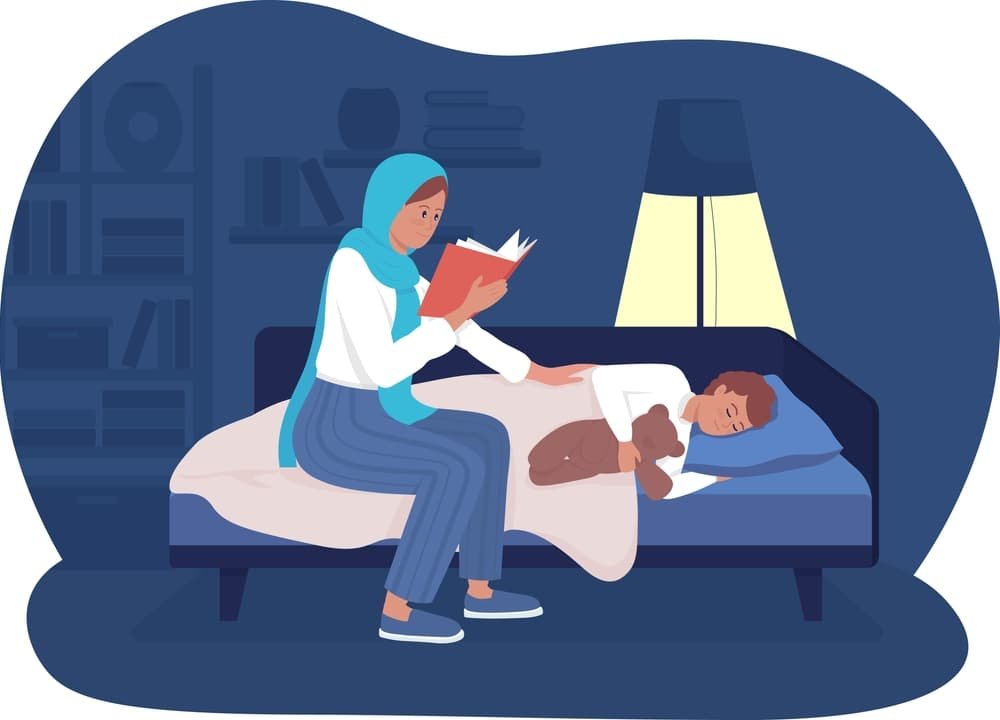
Bedtime Islamic stories hold a cherished place in Muslim families worldwide, serving as a means to lull children to sleep and impart moral values, religious teachings, and cultural heritage. These tales and bedtime Islamic stories, derived from the Quran, Hadith, and Islamic history, offer lessons in patience, courage, honesty, and piety, helping children engagingly internalize the principles of Islam.
As parents and guardians share these captivating accounts of Prophets and righteous companions, they strengthen family bonds and cultivate a love for faith and cultural identity. bedtime Islamic stories provide moments of tranquility, reflection, and connection to the divine, reminding young minds of their purpose and encouraging them to strive for goodness in their daily lives.
BOOK FREE SESSION
What to do before sleeping in Islam?
Muslims strive to utilize the precious moments before sleep in the remembrance of Allah, as sleep is a form of death. Emulating the practices of the Prophet Muhammad (peace be upon him) can ensure a blessed night and earn great rewards from Allah.
Here are some recommended practices before going to bed:
1. Performing Wudu Before Bed:
– The Prophet advised, “Whenever you go to bed, perform wudu as you do for salah, and then lie down on your right side” (Sahih al-Bukhari 247 and Muslim 2710).
(إِذَا أَتَيْتَ مَضْجَعَكَ فَتَوَضَّأْ وُضُوءَكَ لِلصَّلَاةِ)
Performing wudu purifies us and is a recommended practice before sleep. Make wudu a routine before bed to follow the Prophet’s example.
2. Lying on the right side:
refers to the position recommended in Islamic teachings for sleeping or resting. It is mentioned in various narrations of Prophet Muhammad (peace be upon him) that when one lies down to sleep, it is preferable to do so on the right side. This position has both practical and spiritual significance.
ثُمَّ اضْطَجِعْ عَلَى شِقِّكَ الْأَيْمَنِ
5 things to Read Before Sleeping in Islam
1. Dua before Sleeping (Du’a al-Istiftah):
It’s recommended to make a supplication thanking Allah for the day and seeking His protection throughout the night. An example is: “Bismika Allahumma amutu wa ahya.” (In Your name, O Allah, I die and I live).
«بِاسْمِكَ اللَّهُمَّ أَمُوتُ وَأَحْيَا»
-
Reciting Ayat-al-Kursi:
– The Prophet said, “When you go to your bed, recite Ayat-al-Kursi (Al-Baqarah 255), for then there will be a guard from Allah who will protect you all night long, and Satan will not be able to come near you till dawn” (Sahih al-Bukhari).
أخبر النبي ﷺ:( أن من قالها عند النوم لا يزال عليه من الله حافظ، ولا يقربه شيطان حتى يصبح)
Reciting the Throne Verse brings Allah’s protection, ensuring a calm and secure sleep.
3. Reciting Surah Al-Ikhlas, Al-Falaq, and An-Nas:
– The Prophet often recited these surahs before bed, seeking Allah’s protection. Muslims follow his example by making it a nightly habit to recite these short surahs, ensuring a peaceful night.
4. Increasing Dhikr:
– Aisha (R.A) narrated, “When you go to your beds, say: ‘Allahu Akbar’ 33 times, ‘Alhamdulillah’ 34 times, and ‘SubhanAllah’ 33 times. This is better for you than a servant” (Sahih al-Bukhari 5843).
وفي رواية لمسلم قال النبي صلى الله عليه وسلم لهما: (ألا أُعلِّمُكما خيرًا مما سألتُما؟ إذا أخذتُما مضاجعكما، أن تكبِّرا اللهَ أربعاً وثلاثين، وتسبِّحاه ثلاثاً وثلاثين، وتحمَداه ثلاثاً وثلاثين، فهو خيرٌ لكما من خادم)،
Performing dhikr before sleep helps us follow the Prophet’s example and remember Allah’s greatness.
5. Reading Islamic bedtime stories
Additionally, telling bedtime Islamic stories is a meaningful way to end the day. Sharing bedtime Islamic stories of the Prophets and righteous companions reinforces moral values and Islamic teachings, strengthens family bonds, and nurtures a love for faith and cultural identity. Therefore, numerous instances of this are mentioned in the Quran because it is a means to guide the soul towards truth, justice, success, and righteousness. Allah Almighty says: “So relate the stories, perhaps they will reflect.”
(فَاقْصُصِ الْقَصَصَ لَعَلَّهُمْ يَتَفَكَّرُونَ)
BOOK FREE SESSION
What does Islam say about sleeping?
The mention of sleep is found numerous times in the Quran and Sunnah:
-When the Prophet (peace be upon him) woke up, he would say: “Alhamdulillah alladhi Haryana ba’da ma amatana, wa ilayhi an-nushur.”: “Praise be to Allah who has revived us after He made us die, and to Him is the resurrection.
“الحمدُ لله الذي أَحْيَانا بعْدَ ما أماتَنا، وإليه النُّشُورُ»
This is because sleep is akin to death, and Allah returns the soul of the sleeper when they awaken. Therefore, the Prophet praised Allah for returning his soul to Him and waking him up, and “to Him is the resurrection” signifies the belief in resurrection after death. It also means returning to Him to receive the rewards for what we earn in this life.
-Sleep is a blessing and a sign from the signs of Allah, the Almighty, and His favor upon us, as mentioned in His saying:
“And of His signs is your sleep by night and day and your seeking of His bounty. Indeed in that are signs for a people who listen.” (Quran 30:23)
وَمِنْ آيَاتِهِ مَنَامُكُم بِاللَّيْلِ وَالنَّهَارِ وَابْتِغَاؤُكُم مِّن فَضْلِهِ إِنَّ فِي ذَلِكَ لَآيَاتٍ لِّقَوْمٍ يَسْمَعُونَ.
Allah, Exalted is He, says: ‘And it is He who made the night for you as clothing and sleep [i.e rest] and made the day for livelihood.’ [Quran, Surah Al-Furqan 25:47].
وَهُوَ الَّذِي جَعَلَ لَكُمُ اللَّيْلَ لِبَاسًا وَالنَّوْمَ سُبَاتًا وَجَعَلَ النَّهَارَ نُشُورًا ﴾
And He says: ‘And We made your sleep [a means for] rest.’ [Quran, Surah An-Naba 78:9
﴿ وَجَعَلْنَا نَوْمَكُمْ سُبَاتًا ﴾
The meaning of sleep as ‘rest’ implies a cessation of bodily comfort. During the day, the limbs and organs are engaged in various activities, but when night falls and tranquility prevails, the limbs rest, resulting in sleep, and rejuvenating both body and soul.
Bedtime Islamic stories for 3-year-olds

Educational and bedtime Islamic stories are highly beneficial for children at this age and should be suitable for their minds and understanding. These bedtime Islamic stories should be crafted simply and easily, allowing children to benefit from the situations and events within the story. Additionally, mothers telling bedtime Islamic stories to their children can encourage them to participate in narrating the story and repeating what happens.
Here are some good bedtime Islamic stories for 3-year-old
- Story of Mercy as a Muslim Characteristic
Once, a man traveling through a desert found a deep well and quenched his thirst. Later, he saw a thirsty dog. He returned to the well, filled his shoe with water, and gave it to the dog. As a result of his mercy, Allah forgave him and granted him Paradise.
Lesson: Showing kindness to animals and helping others brings great rewards from Allah.it is considered one of the good bedtime Islamic stories
- Story of Allah Sees Me
A father asked his sons Ahmed, Saeed, and Khalid to hide eggs where no one could see. Ahmed and Saeed hid their eggs, but Khalid returned with his egg, saying he couldn’t hide it because Allah saw and heard everything.
Lesson: Learn to fear Allah everywhere, as He sees and hears all.it is considered one of the good bedtime Islamic stories
- Story of the People of the Elephant
King Abraha built a church to rival the Kaaba but failed. He tried to destroy the Kaaba with elephants but failed again. Allah sent birds with stones to defeat Abraha’s army, saving the Kaaba.
Lesson: Allah’s power protects His sacred places and sends blessings, like the birth of Prophet Muhammad, peace be upon him, a mercy to all mankind. In addition to narrating the story, the child can learn and memorize Surah Al-Fil (Chapter 105 of the Quran), which tells about how Allah protected the Kaaba from Abraha’s army, emphasizing Allah’s power and protection.it is considered one of the good bedtime Islamic stories.
BOOK FREE SESSION
Islamic bedtime Stories or storybooks
Here are some recommendations for Islamic bedtime storybooks that are suitable for children:
- “Goodnight Stories from the Quran” by Saniyasnain Khan:
This book offers simplified stories from the Quran with beautiful illustrations, perfect for bedtime reading.
- “365 Days with the Prophet Muhammad” by Nurdan Damla:
A collection of short stories about the life of Prophet Muhammad (peace be upon him), designed for daily reading or bedtime stories.
- “My First Quran Storybook” by Saniyasnain Khan:
It includes 42 easy-to-read Quran stories that children will love to read as part of their bedtime routine.
- “Tell Me About Hajj” by Saniyasnain Khan:
This book introduces children to the significance of Hajj through engaging stories, making it a great choice for bedtime reading.
- “A Treasury of Islamic Values for Children” by Aysenur Gunes:
This collection includes stories that teach Islamic values and morals, ideal for bedtime storytelling.
These books provide a mix of stories from the Quran, the life of Prophet Muhammad (peace be upon him), and Islamic values, tailored to captivate young minds and foster a love for Islamic teachings. These books are often available in audiobook format, allowing children to listen to bedtime Islamic stories.
What does the Quran say about sleeping early?
The Quran does not specifically mention sleeping early as a directive or commandment. However, it does emphasize the importance of balanced living and the benefits of sleep as a natural part of human life.
–The verbal and practical Sunnah of the Prophet (peace be upon him) regarding his sleep is as follows:
- Sleeping early except for necessities, and waking up in the last third of the night for Qiyaam (night prayer). It is narrated in Sahih Bukhari that Abu Huraira reported: The Messenger of Allah (peace be upon him) disliked sleeping before the ‘Isha prayer and conversing after it.”
، فقد روى البخاري عن أبي برزة أن رسول الله صلى الله عليه وسلم: كان يكره النوم قبل العشاء والحديث بعدها.
Where Can You Find Authentic Bedtime Islamic Stories?
You can find authentic bedtime Islamic stories, including bedtime stories and courses, at the Sheikh Saleh Academy. We offer a variety of resources designed to educate and inspire, focusing on authentic Islamic teachings suitable for children and adults alike. You can visit their website or contact them directly to explore their offerings and access these valuable resources.
When Did Islamic Stories Become Popular?
Islamic stories have been popular since the early days of Islam, spreading through oral tradition and later through written texts. The popularity of Islamic stories grew significantly during the lifetime of Prophet Muhammad (peace be upon him) and the subsequent Caliphates. During these times, stories of the Prophets, companions of the Prophet Muhammad, and other significant figures in Islamic history were shared to teach morals, ethics, and religious lessons.
Where Can We Find Inspiration for Bedtime Islamic Stories?
You can find inspiration for bedtime Islamic stories from the Quran, Hadiths, biographies of Prophets and Companions, Islamic literature, cultural traditions, contemporary interpretations, and specialized educational institutions like the Sheikh Saleh Academy. These sources offer a diverse range of narratives that convey moral values, spiritual guidance, and cultural heritage within the Islamic tradition.
Read more about:
Islamic classes for 3 year olds
basic islamic knowledge for toddlers